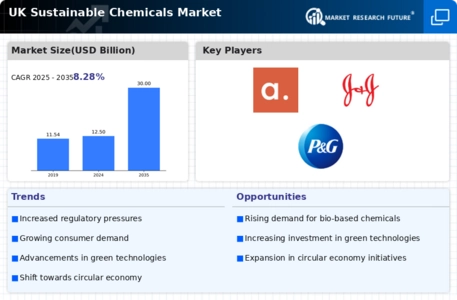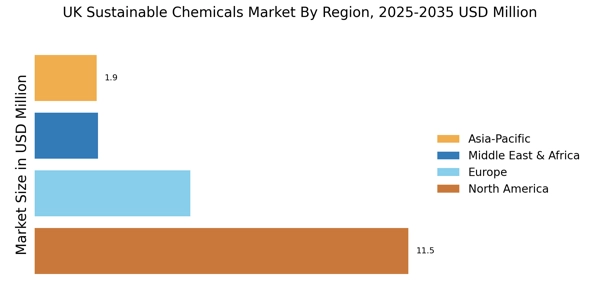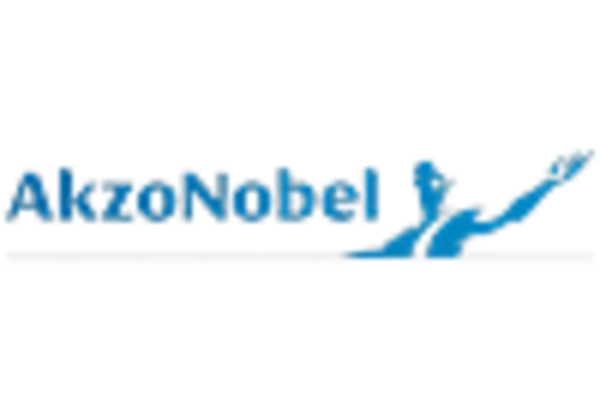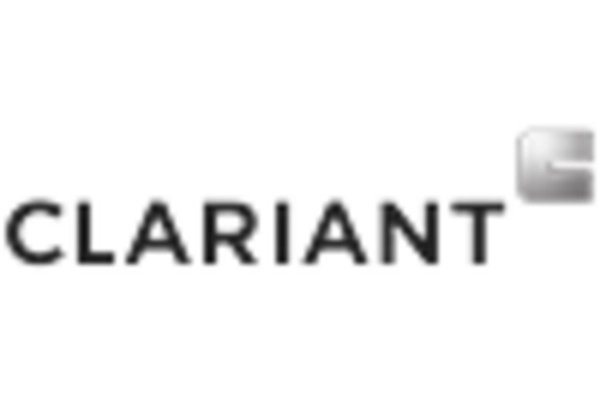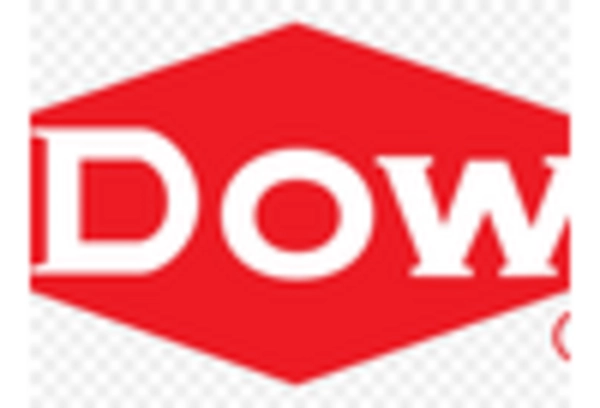Shifts in Consumer Preferences
Consumer preferences are evolving, and this shift is profoundly impacting the UK Sustainable Chemicals Market. There is a growing demand for eco-friendly products, with consumers increasingly seeking out brands that demonstrate a commitment to sustainability. Surveys indicate that over 70% of consumers are willing to pay a premium for products made from sustainable materials. This trend is prompting manufacturers to reformulate their products and adopt sustainable practices in order to meet consumer expectations. As a result, companies within the UK Sustainable Chemicals Market are likely to innovate and diversify their offerings to cater to this demand. This consumer-driven change not only enhances brand loyalty but also drives the overall growth of the sustainable chemicals sector.
Collaboration Across Industries
Collaboration across various industries is emerging as a pivotal driver for the UK Sustainable Chemicals Market. Partnerships between chemical manufacturers, technology providers, and research institutions are fostering innovation and accelerating the development of sustainable solutions. For instance, collaborations aimed at creating bio-based alternatives to traditional chemicals are gaining traction, as they leverage the expertise of multiple stakeholders. These partnerships not only enhance research capabilities but also facilitate the sharing of resources and knowledge, which can lead to more efficient production processes. Moreover, such collaborations can help in addressing regulatory challenges and aligning with sustainability goals. Therefore, the UK Sustainable Chemicals Market is likely to see an increase in collaborative efforts, which could significantly enhance its growth trajectory.
Government Initiatives and Policies
The UK Sustainable Chemicals Market is significantly influenced by government initiatives aimed at promoting sustainability. The UK government has implemented various policies that encourage the development and adoption of sustainable chemical practices. For example, the UK has set ambitious targets to reduce greenhouse gas emissions by 68% by 2030, which necessitates a transition towards sustainable chemical production. Additionally, funding programs and grants are available to support research and development in this sector. These initiatives not only provide financial backing but also create a regulatory framework that incentivizes companies to innovate and adopt sustainable practices. Consequently, the UK Sustainable Chemicals Market is poised for growth as businesses align their strategies with governmental sustainability objectives.
Increasing Investment in Sustainable Solutions
Investment in sustainable solutions is a driving force within the UK Sustainable Chemicals Market. As awareness of environmental issues grows, investors are increasingly channeling funds into companies that prioritize sustainability. Reports indicate that investments in sustainable chemicals have surged, with projections suggesting a compound annual growth rate of over 10% in the coming years. This influx of capital is enabling companies to expand their research and development efforts, leading to the creation of innovative, eco-friendly products. Furthermore, the financial community is recognizing the long-term viability of sustainable practices, which may lead to a more resilient market. Thus, the UK Sustainable Chemicals Market stands to benefit from this trend, as it attracts more investment aimed at fostering sustainable development.
Technological Advancements in Chemical Production
The UK Sustainable Chemicals Market is experiencing a notable transformation due to advancements in production technologies. Innovations such as green chemistry and bioprocessing are enabling manufacturers to create sustainable chemicals with reduced environmental impact. For instance, the adoption of enzymatic processes has been shown to lower energy consumption by up to 30%, thereby enhancing efficiency. Furthermore, the integration of digital technologies, such as artificial intelligence and machine learning, is streamlining operations and optimizing resource use. This shift not only aligns with sustainability goals but also positions companies competitively in a market that increasingly values eco-friendly practices. As a result, the UK Sustainable Chemicals Market is likely to witness a surge in investment towards these technologies, fostering a more sustainable future.


